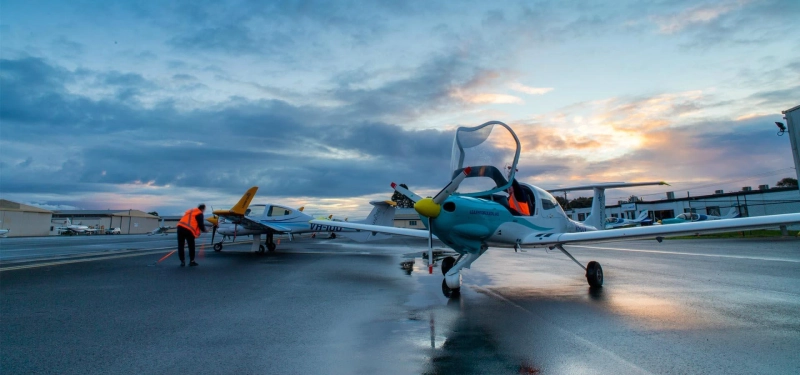Many flight schools around the country offer what is known as a Diploma of Aviation. This qualification usually incorporates the CASA-recognised Commercial Pilot Licence, alongside additional subjects and experiences to help best prepare you to take to the skies.
Many students wonder what professional pathways are open to them after having completed a Diploma of Aviation. Of course, the qualification will prepare you for a career as a commercial pilot. However, there are many other equally exciting and rewarding jobs you can pursue that are perhaps less well advertised.
What is a Diploma of Aviation?
A Diploma of Aviation is exactly what the name suggests — a formal qualification that will most likely enable you to pursue a career as a commercial pilot. The exact nature of the qualification depends on the flight school or university you attend, so be sure to double check what you are signing up for.
CASA, or the Civil Aviation Safety Authority, is the governing aviation body of Australia. They are responsible for ensuring that pilots are appropriately trained and qualified before taking to the skies. To pursue a career as a commercial pilot, CASA dictates that you must possess your Commercial Pilot Licence, or CPL.
A Diploma of Aviation should cover all the course materials and training experience required for you to obtain your CPL. In addition, it will likely involve extra subjects that will help you succeed professionally in the aviation industry.
Career pathways
If you have always dreamed of being a pilot, you’ve probably pictured yourself sitting in the cockpit of a Boeing 747, flying hundreds of passengers halfway around the world. While a Diploma of Aviation will certainly prepare you for this type of career, there are a number of other possible jobs you might like to pursue. We’ll take a look at the more common ones.
Airline pilot
An airline pilot is employed by an airline to (usually) carry passengers to and from their destination. You might fly domestically (eg. Melbourne to Sydney), or internationally (Melbourne to London) if you are flying for a larger airline.
Commercial pilots have significant responsibility in ensuring passenger safety. In addition to technical flying skills, they must also be open communicators and possess the ability to make informed decisions in high-pressure situations.
Private pilot
A private pilot requires identical skills and traits to a commercial pilot. The main difference between the two is the types of passengers they carry.
A private pilot usually works for a smaller company and will have a strict set of clients. This can include everyone from politicians to sporting teams.
Note: don’t confuse the role of a private pilot with a Private Pilot Licence. The latter is a specific licence type that does not allow you to get paid to fly (except under some fairly specific circumstances).
Charter pilot
Similar to a private pilot, a charter pilot usually works for smaller companies. Charter companies typically offer specific flight experiences (for example joy flights or scenic flights), or simply offer their customers an aircraft and pilot for hire.
Agricultural pilot
Agricultural pilots play an important role in Australia’s farming industry. They are highly skilled professionals who conduct a number of tasks that assist with the growing, cultivation, and transport of crops.
An agricultural pilot may conduct crop dusting, transport cargo, or get a bird’s eye view on the health and viability of crops.
Cargo pilot
We often take for granted the fact that everything we need is at our fingertips — or at least can be delivered in a timely manner. Behind the scenes making all of this happen is usually a cargo pilot.
A cargo pilot transports goods and freight on behalf of a company. They may work for a private courier service or for a business. Being a cargo pilot often means you have the chance to fly a wide variety of different planes, depending on the size of the load you are carrying.
Flight instructor
One of the best career moves after completing a Diploma of Aviation is to become a flight instructor. Many of the previously mentioned pilot roles require that you have a certain number of flying hours before you are able to apply. Whilst a rewarding career path in itself, being a flight instructor is a great way to increase your own flying hours while getting paid.
As you can see, there are many opportunities that will open themselves up to you upon receiving your Diploma of Aviation. For a more comprehensive list and tailored advice, speak to a flight school today. The best flight schools are those that structure their training to provide as many career pathways as possible for their students. Who knows where you might one day end up — safe to say, whatever your responsibilities are, you’ll enjoy your time in the skies.


